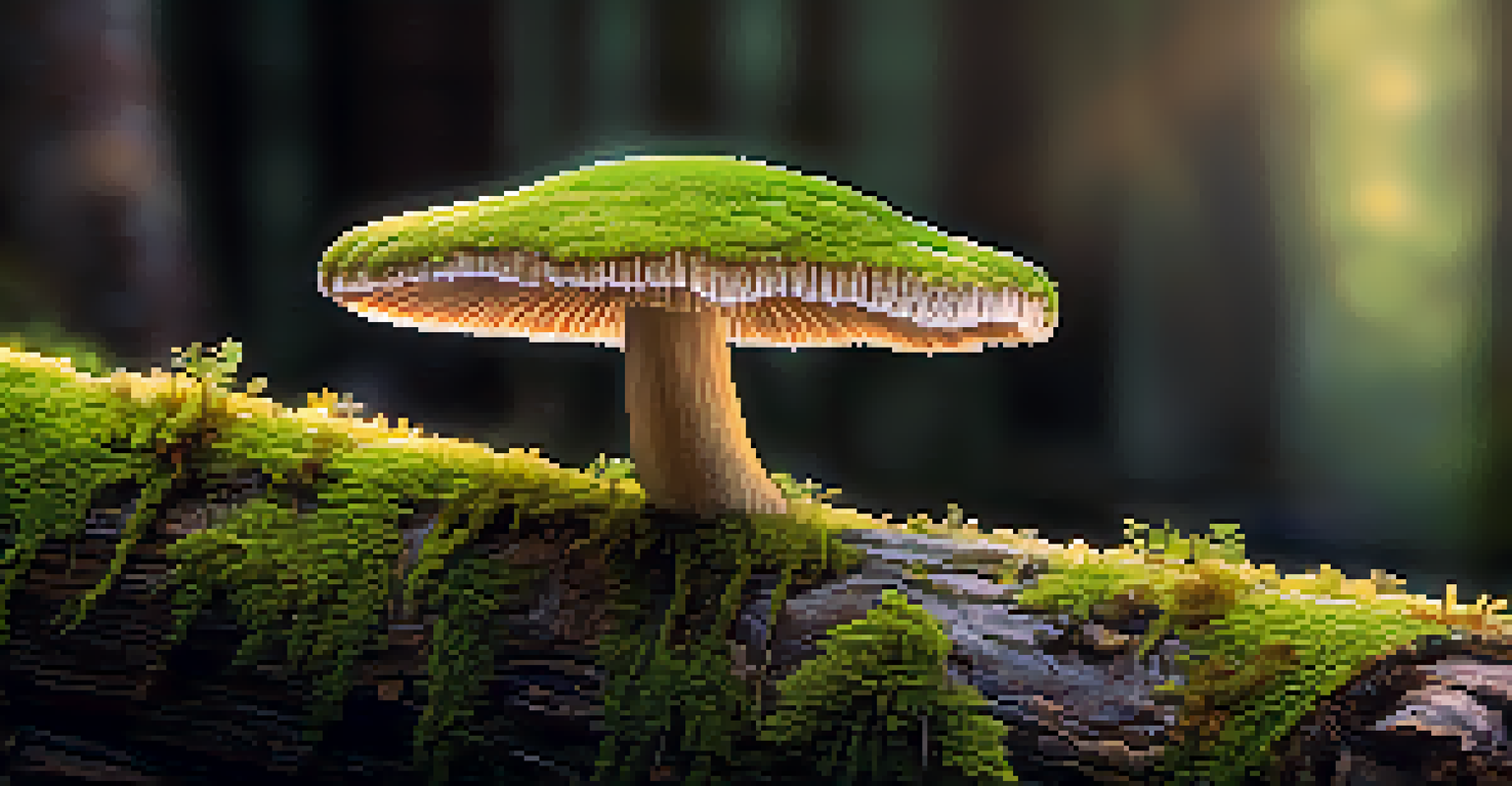Altered States: How Psychedelics Influence Ecological Thinking

Introduction to Psychedelics and Ecological Thinking
Psychedelics have long been associated with altered states of consciousness, sparking interest in how they can influence our perception of the world. One area of growing research is the intersection between psychedelics and ecological thinking. This article explores how these substances might deepen our understanding of nature and our place within it.
The greatest threat to our planet is the belief that someone else will save it.
At their core, psychedelics can induce experiences that challenge conventional thought patterns, allowing individuals to perceive connections they might normally overlook. This can lead to a heightened sense of empathy and awareness, not only towards other people but also towards the environment. Understanding these connections is vital as we face pressing ecological challenges.
By examining both historical and contemporary perspectives, we can begin to appreciate the potential role psychedelics might play in fostering a more sustainable way of living. After all, when we feel more connected to the natural world, we are often more motivated to protect it.
The Science Behind Psychedelics and Consciousness
Psychedelics, such as psilocybin and LSD, work by interacting with serotonin receptors in the brain, leading to altered perceptions and enhanced emotional experiences. Research indicates that these substances can disrupt the default mode network, a brain system associated with self-referential thoughts. This disruption facilitates a sense of connectedness, which can extend beyond oneself to the environment.

For many users, this experience can evoke profound feelings of unity with nature. Imagine standing in a lush forest and feeling as if you’re not just an observer but an integral part of the ecosystem. Such experiences can profoundly alter how people view their relationship with the environment, encouraging more ecologically friendly behaviors.
Psychedelics Enhance Nature Connection
Experiences with psychedelics can foster a profound sense of unity with nature, encouraging individuals to adopt more eco-friendly behaviors.
As we delve deeper into the science, it's crucial to recognize that these experiences vary widely among individuals. Factors such as setting, mindset, and personal beliefs play significant roles in shaping how one interprets their psychedelic experiences.
Historical Context of Psychedelics and Nature
Historically, many indigenous cultures have used psychedelics in spiritual rituals, often emphasizing a deep connection to nature. For example, the use of ayahuasca in the Amazon is a prime illustration of how these substances can facilitate spiritual experiences tied to ecological wisdom. Such practices highlight the longstanding relationship between altered states and environmental stewardship.
We won't have a society if we destroy the environment.
These rituals often involve journeys that reveal insights about the interconnectedness of life, encouraging participants to respect and protect their surroundings. In this way, psychedelics serve as a bridge between personal transformation and a broader ecological consciousness.
As we look back, we can see that these ancient practices offer valuable lessons for modern society. They remind us that our relationship with nature is not merely transactional but deeply intertwined with our spiritual and emotional lives.
Modern Research on Psychedelics and Ecological Awareness
In recent years, scientific studies have begun to explore how psychedelics might enhance ecological awareness. Research indicates that participants in psychedelic experiences often report increased feelings of connectedness to nature and a greater sense of responsibility for environmental stewardship. This suggests that psychedelics could play a role in fostering pro-environmental behaviors.
One notable study found that individuals who experienced profound mystical-type experiences during psychedelic sessions were more likely to engage in environmentally friendly actions post-experience. This shift in behavior can be attributed to a transformed worldview that emphasizes the importance of ecological balance.
Historical Wisdom and Ecological Care
Indigenous cultures have long used psychedelics in rituals that emphasize respect for nature, offering valuable lessons for modern ecological consciousness.
As modern society grapples with pressing environmental crises, the implications of these findings are significant. They suggest that psychedelics may offer not only personal healing but also a pathway to collective ecological consciousness.
Psychedelics as Tools for Ecological Education
Psychedelics can also serve as powerful tools for ecological education and awareness. By facilitating deep, introspective experiences, they can help individuals confront their beliefs and assumptions about the environment. This can lead to a more nuanced understanding of ecological issues and inspire meaningful change.
For example, workshops and retreats that incorporate guided psychedelic experiences often include discussions on sustainability and environmental ethics. Participants report that these experiences help them internalize the importance of protecting the planet, leading to more informed and committed action.
The potential for psychedelics in educational settings raises exciting possibilities for fostering a generation that is not only aware of ecological issues but also inspired to take action. This could be a game-changer in our approach to environmental education.
Challenges and Considerations in Using Psychedelics
While the potential benefits of psychedelics for enhancing ecological thinking are promising, there are also challenges and ethical considerations to keep in mind. The legality of these substances varies widely across regions, which can limit access to those who might benefit most from them. Additionally, the importance of safe and responsible use cannot be overstated.
Furthermore, individuals who seek out psychedelics for ecological insights should do so with a clear intention and understanding of the risks involved. Having a supportive and knowledgeable guide can help ensure a positive experience that aligns with their goals of fostering ecological awareness.
Psychedelics as Educational Tools
Guided psychedelic experiences can serve as powerful educational tools, helping participants confront their beliefs about the environment and inspiring meaningful action.
Ultimately, as interest in psychedelics grows, so too must our commitment to responsible exploration. Balancing the potential benefits with ethical considerations will be crucial in harnessing their power for ecological good.
The Future of Psychedelics and Ecological Action
Looking ahead, the relationship between psychedelics and ecological action could shape new paradigms in how we approach environmentalism. As research continues to uncover the benefits these substances may offer, we might see an increase in programs designed to integrate psychedelics into ecological initiatives. This could lead to innovative strategies for addressing environmental challenges.
Imagine a future where environmental activists harness the insights gained from psychedelic experiences to inspire collective action. By fostering a deep sense of connection to the Earth, these individuals could become powerful advocates for sustainable practices, leading movements that prioritize planetary health.

The potential for psychedelics to act as catalysts for ecological change is both exciting and hopeful. As we navigate the complexities of our ecological crises, embracing such unconventional avenues may be essential for forging a sustainable future.